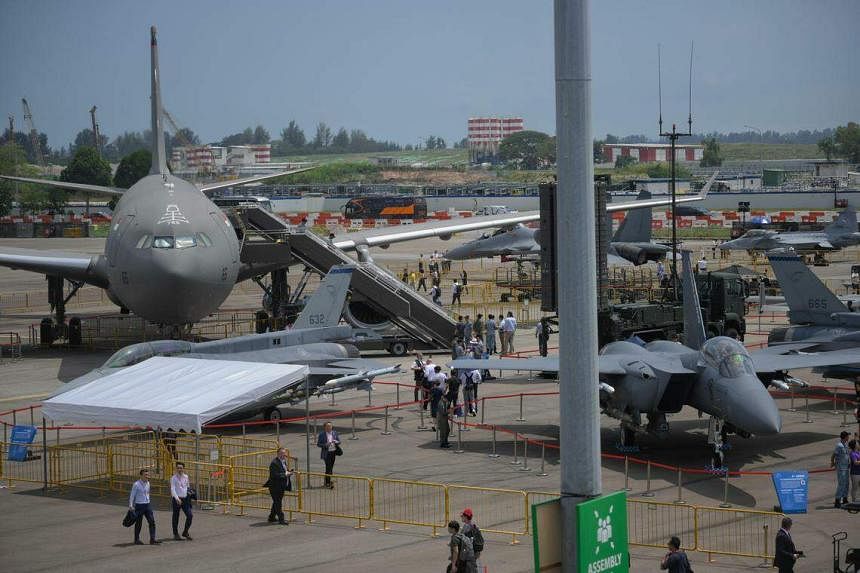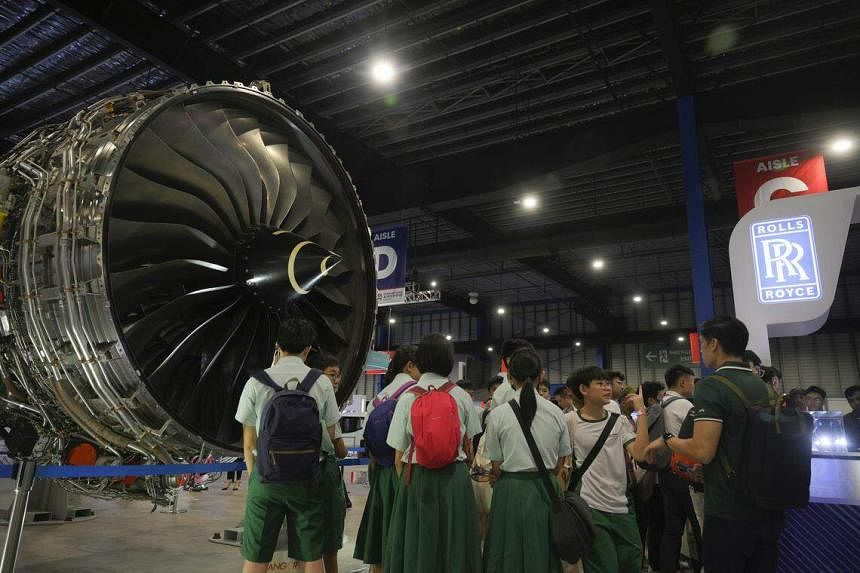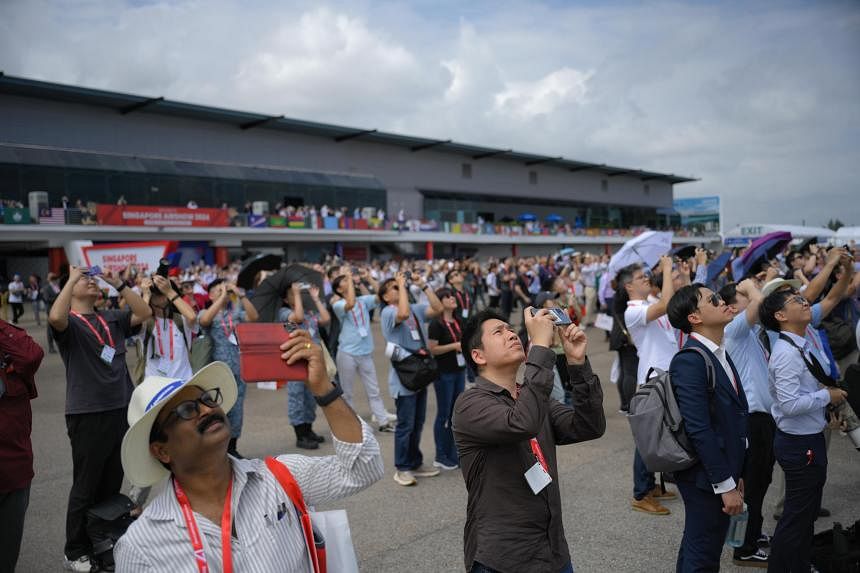SINGAPORE - Nearly 60,000 trade visitors attended the first four days of the Singapore Airshow, eclipsing the previous record set in 2018 by 10 per cent, said organiser Experia Events.
“It clearly signals a renewed optimism and momentum driving the sector forward,” its managing director Leck Chet Lam said on Feb 23 in a statement to mark the end of the show’s four-day trade segment.
The ninth edition of the biennial aerospace and defence exhibition began on Feb 20, six years since the last full-scale show. Covid-19 disrupted the 2020 and 2022 editions.
Mr Leck told The Straits Times that visitors and exhibitors had only three words to describe the 2024 show: “Busy, busy, busy”.
China’s growing presence
The biggest buzz was around China’s home-grown Comac C919 narrow-body passenger jet, which made its international debut.
Comac also kicked off the show with an order of 50 planes from Tibet Airlines.
America’s Boeing and Airbus from Europe announced their share of orders too.
In all, Asia-Pacific carriers including Thai Airways, Vietjet and Taiwan’s Starlux bought 77 planes from the two companies.
About 40 Chinese aviation companies took part in the 2024 show, and 31 of them joined hands to set up a country pavilion for the first time. This was organised by the Chinese Society of Aeronautics and Astronautics, and its vice-president and secretary-general, Dr Yao Junchen, said discussions between the companies and trade visitors were active. “We look forward to coming back on a bigger scale,” he added in Mandarin.
Mr Leck said the air show offers the Chinese a platform to be connected with the rest of the Asia-Pacific and beyond.
While Airbus said the C919 is not going to rock the boat and Boeing pointed to growing challenges Comac needs to overcome, both recognised the competition the Chinese aircraft-maker will pose.
Dr Yao said Comac’s aim is to go global. “If you use your civil aircraft only within your own country, it will be a huge failure,” he added.
Sustainability takes centre stage
Experia said Singapore’s plan to add a green fuel passenger levy for all departing flights from 2026 – announced a day before the show – sparked extensive discussions.
On the show’s opening day, Civil Aviation Authority of Singapore (CAAS) chief Han Kok Juan explained the move at a dialogue attended by about 70 people, saying the authorities here have no choice but to require airlines to use sustainable fuel, even though it will make air travel more expensive.
Mr Han said: “It is really a matter of time that we would have to deploy sustainable aviation fuel in our respective airports... If you leave it to the passengers, it’s going to be very difficult.”
Several sustainability announcements were made at the air show, including an agreement Airbus signed with the Economic Development Board (EDB) to open the way for a sustainable aviation hub to take root at Seletar Aerospace Park.
With the show casting the spotlight on the topic of going green, Ms Karina Cady, co-founder of Singapore firm Nandina REM, which recycles materials from decommissioned aircraft, said people have come up to her to proactively look for sustainable solutions.
“I didn’t realise there would be so much traction and interest that we are already looking at new customers,” she added.

Air taxis edge closer to reality, but not quite yet for S’pore
Electric vertical take-off and landing vehicles (eVTOLs) were another talking point.
Several deals were signed to advance the adoption of the technology in the region.
Supernal, a subsidiary of South Korea’s Hyundai Group, inked an agreement with EDB to develop research and development initiatives and identify potential uses for eVTOLs in Singapore.
It also signed an agreement with CAAS to support the development of regulations and standards here, and to engage the public.
German eVTOL firm Lilium made a tentative deal with PhilJets for the private aviation firm from the Philippines to buy 10 Lilium Jets, which are powered by electric motors. Embraer offshoot Eve Air Mobility also inked a deal to study the potential for eVTOL flights in South-east Asia.
Mr Tay Yun Yuan, head of Asia-Pacific at mobility firm Skyports, said international air-taxi operations could kick off by the end of the decade.
Others such as Ms Amanda Nelson, director of strategic relationships for advanced air mobility at Bristow Group, which deals in vertical flight solutions, said limited, small-scale air-taxi operations could start within the next 1½ years.
But for the technology to be commercialised in Singapore, scale will be key, said Mr Tan Kah Han, chief technology officer and senior director of the unmanned systems group at CAAS.
“Why would I facilitate (the operations of) aircraft with four passengers, versus aircraft with 150 passengers? The scale is completely different,” Mr Tan said at a panel discussion.
Supply chain issues linger as aerospace sector expands
Even as the last vestiges of the pandemic recede, the issue of supply chains continued to haunt the trade floor in 2024.
“Supply chain is a common discussion that we have with everyone at this air show – be it air framers, airlines or leasing companies,” Mr Ewen McDonald, chief customer officer for civil aerospace at aircraft engine-maker Rolls-Royce, told ST.
Airbus commercial aircraft chief Christian Scherer said at a media roundtable that there are weak links at almost every level, noting bottlenecks with raw materials such as steel.
On a positive note, a slew of aerospace maintenance, repair and overhaul (MRO) companies expanded their presence and capabilities here, or announced plans to do so.

Making the biggest splash was Singapore Aero Engine Services, a joint venture between Rolls-Royce and SIA Engineering Company, which announced a US$180 million (S$242 million) expansion plan.
A common refrain was Singapore’s strategic importance and the value of its ecosystem. “In the whole of Singapore, there is lots of MRO, lots of job creation happening, so I would say things are looking good,” said Mr McDonald of Rolls-Royce.
Looking ahead to the 2026 air show, which will be the 10th organised by Experia, Mr Leck said artificial intelligence will be front and centre. “I’m sure that will be incorporated into Airshow 2026 as one of the focuses,” he added.

